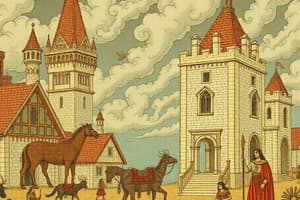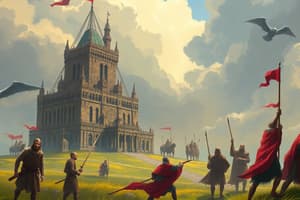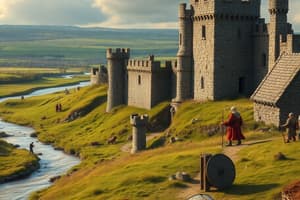Podcast
Questions and Answers
What was a significant cultural contribution of the Vikings to Britain?
What was a significant cultural contribution of the Vikings to Britain?
- Hierarchical social structure
- Formulation of trade agreements
- Establishment of feudalism
- Influence on language (correct)
Which group is credited with the establishment of new kingdoms in Britain?
Which group is credited with the establishment of new kingdoms in Britain?
- Celts
- Vikings
- Normans
- Anglo-Saxons (correct)
How did the social structure of Anglo-Saxon society differ from that of the Normans after the Conquest?
How did the social structure of Anglo-Saxon society differ from that of the Normans after the Conquest?
- It was more rigidly structured.
- It had a more hierarchical arrangement.
- It was less rigidly structured. (correct)
- It was highly decentralized.
What was a major economic focus of the Anglo-Saxon period?
What was a major economic focus of the Anglo-Saxon period?
What transformation did the Normans bring to the English political system?
What transformation did the Normans bring to the English political system?
What was a primary motivation for Viking raids on Britain?
What was a primary motivation for Viking raids on Britain?
Which event marked a significant turning point in English history during the Norman Conquest?
Which event marked a significant turning point in English history during the Norman Conquest?
What distinguished Anglo-Saxon society from that of the Vikings?
What distinguished Anglo-Saxon society from that of the Vikings?
What was a key characteristic of the Anglo-Saxon social structure?
What was a key characteristic of the Anglo-Saxon social structure?
What was one of the outcomes of the Norman Conquest?
What was one of the outcomes of the Norman Conquest?
What approach did the Vikings initially take towards their raids?
What approach did the Vikings initially take towards their raids?
Which king of the Anglo-Saxons is noted for resisting Viking invasions?
Which king of the Anglo-Saxons is noted for resisting Viking invasions?
What impact did the Viking invasions have on the Anglo-Saxon kingdoms?
What impact did the Viking invasions have on the Anglo-Saxon kingdoms?
Flashcards
Anglo-Saxons
Anglo-Saxons
A group of Germanic tribes (Angles, Saxons, Jutes) who migrated to Britain in the 5th and 6th centuries, replacing much of the existing Romano-British population. They established kingdoms and introduced a unique language, which formed the basis of modern English.
Vikings
Vikings
Scandinavian seafarers who launched raids and invasions across Europe, including Britain, from the late 8th century. Known for their fierce warrior culture, they often targeted monasteries and coastal settlements, eventually settling and influencing the social, economic, and political landscape of Anglo-Saxon Britain.
Norman Conquest
Norman Conquest
The invasion of England by William, Duke of Normandy, in 1066, which led to a significant turning point in English history. It replaced the Anglo-Saxon aristocracy with Norman nobles and brought changes to the language, architecture, and customs of England.
Anglo-Saxon Social Structure
Anglo-Saxon Social Structure
Signup and view all the flashcards
Anglo-Saxon Warrior Culture
Anglo-Saxon Warrior Culture
Signup and view all the flashcards
Battle of Maldon
Battle of Maldon
Signup and view all the flashcards
Guthrum
Guthrum
Signup and view all the flashcards
Battle of Hastings
Battle of Hastings
Signup and view all the flashcards
Cultural Exchange in Anglo-Saxon England
Cultural Exchange in Anglo-Saxon England
Signup and view all the flashcards
Political Impact of Anglo-Saxon and Norman Influence
Political Impact of Anglo-Saxon and Norman Influence
Signup and view all the flashcards
Social Structure in Anglo-Saxon England
Social Structure in Anglo-Saxon England
Signup and view all the flashcards
Economic Impact of Various Groups in Anglo-Saxon England
Economic Impact of Various Groups in Anglo-Saxon England
Signup and view all the flashcards
Legacy of Anglo-Saxon, Viking, and Norman Influence
Legacy of Anglo-Saxon, Viking, and Norman Influence
Signup and view all the flashcards
Study Notes
Anglo-Saxon Britain
- The Anglo-Saxons, a group of Germanic tribes (Angles, Saxons, Jutes), migrated to Britain in the 5th and 6th centuries.
- They established kingdoms in southern and central Britain, replacing much of the Romano-British population.
- Anglo-Saxon society was hierarchical, with a warrior culture emphasizing kinship.
- They developed a language that forms the basis of modern English.
- Important Anglo-Saxon kings include Alfred the Great, who resisted Viking invasions and promoted literacy.
Viking Invasions
- Vikings, Scandinavian seafarers, launched raids across Europe, including Britain, from the late 8th century.
- Motivations included population pressure, wealth, and expanding trade routes.
- They often targeted monasteries and coastal settlements.
- Initially focused on looting, Viking activities evolved into settlement and conquest.
- Vikings established trade routes and influenced economic and political structures.
- Their arrival led to conflict, alliances, and cultural exchange with Anglo-Saxon kingdoms.
- The Battle of Maldon exemplifies Anglo-Saxon resistance to Viking attacks.
- Guthrum, a Viking leader, converted to Christianity and became a king.
Norman Conquest
- The Norman Conquest, the invasion of England by William, Duke of Normandy, occurred in 1066.
- Edward the Confessor's death triggered William's claim to the English throne.
- The Battle of Hastings saw William's decisive victory over Harold Godwinson's English army.
- William's victory significantly altered English history.
- The Norman Conquest replaced the Anglo-Saxon aristocracy with Norman nobles, transforming the political landscape.
- Norman architecture, language, and customs significantly influenced English culture.
Key Differences and Similarities
- Anglo-Saxons, Vikings, and Normans: Anglo-Saxons settled, Vikings raided/settled, and Normans conquered, impacting British development in diverse ways.
- Cultural Exchange: Viking influence on language and Norman contributions to architecture demonstrate significant cultural exchanges.
- Political Impact: Establishment of Anglo-Saxon kingdoms, Viking alliances, and Norman political overhaul represent varied but impactful political changes.
- Social Structure: Anglo-Saxon society was hierarchical, less rigidly structured than the Norman feudal system; Vikings also influenced social networks.
- Economic Impact: Anglo-Saxon trade and agriculture, Viking trade routes, and the feudal economic system established by the Normans all significantly shaped the British economy.
Studying That Suits You
Use AI to generate personalized quizzes and flashcards to suit your learning preferences.




